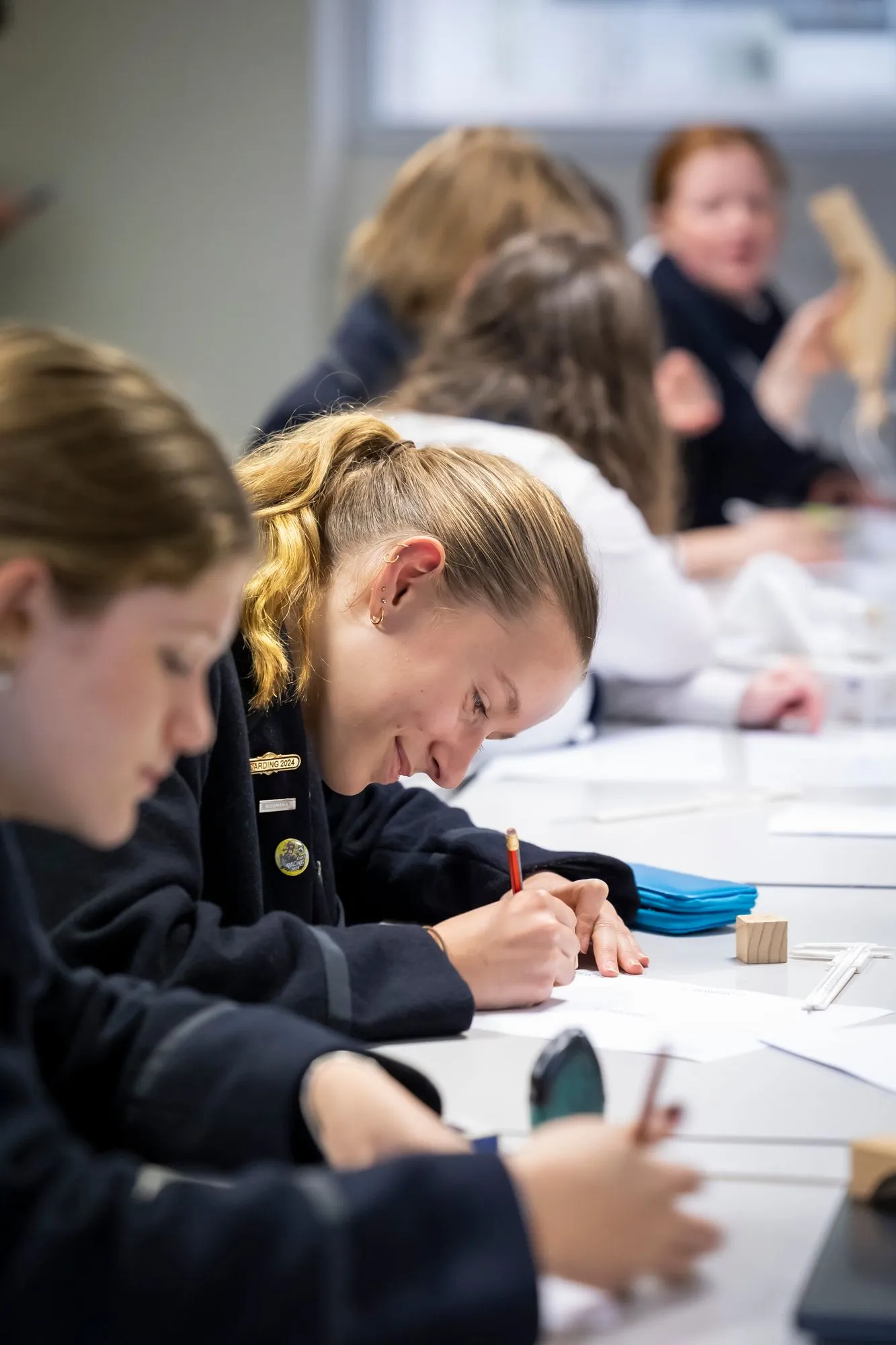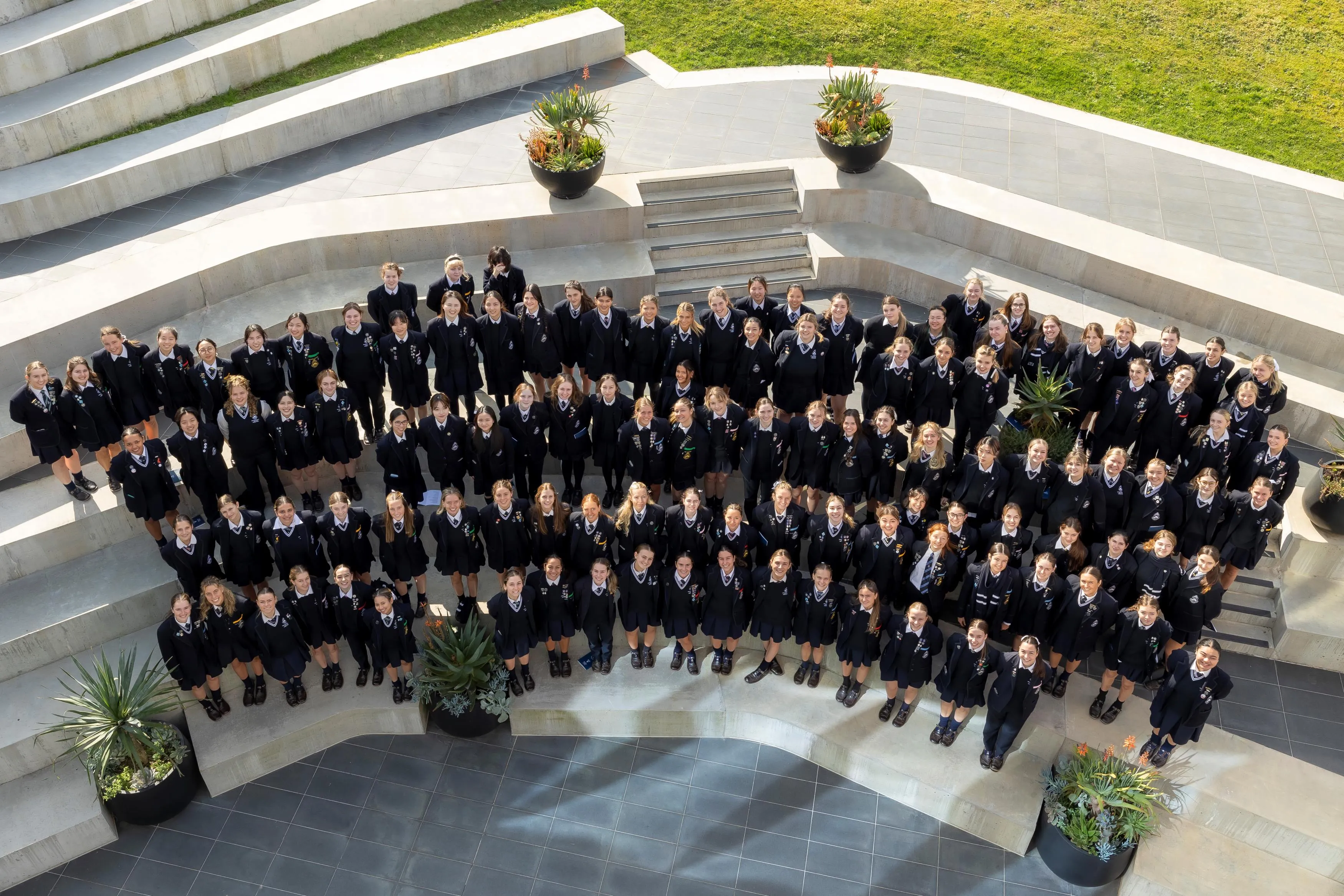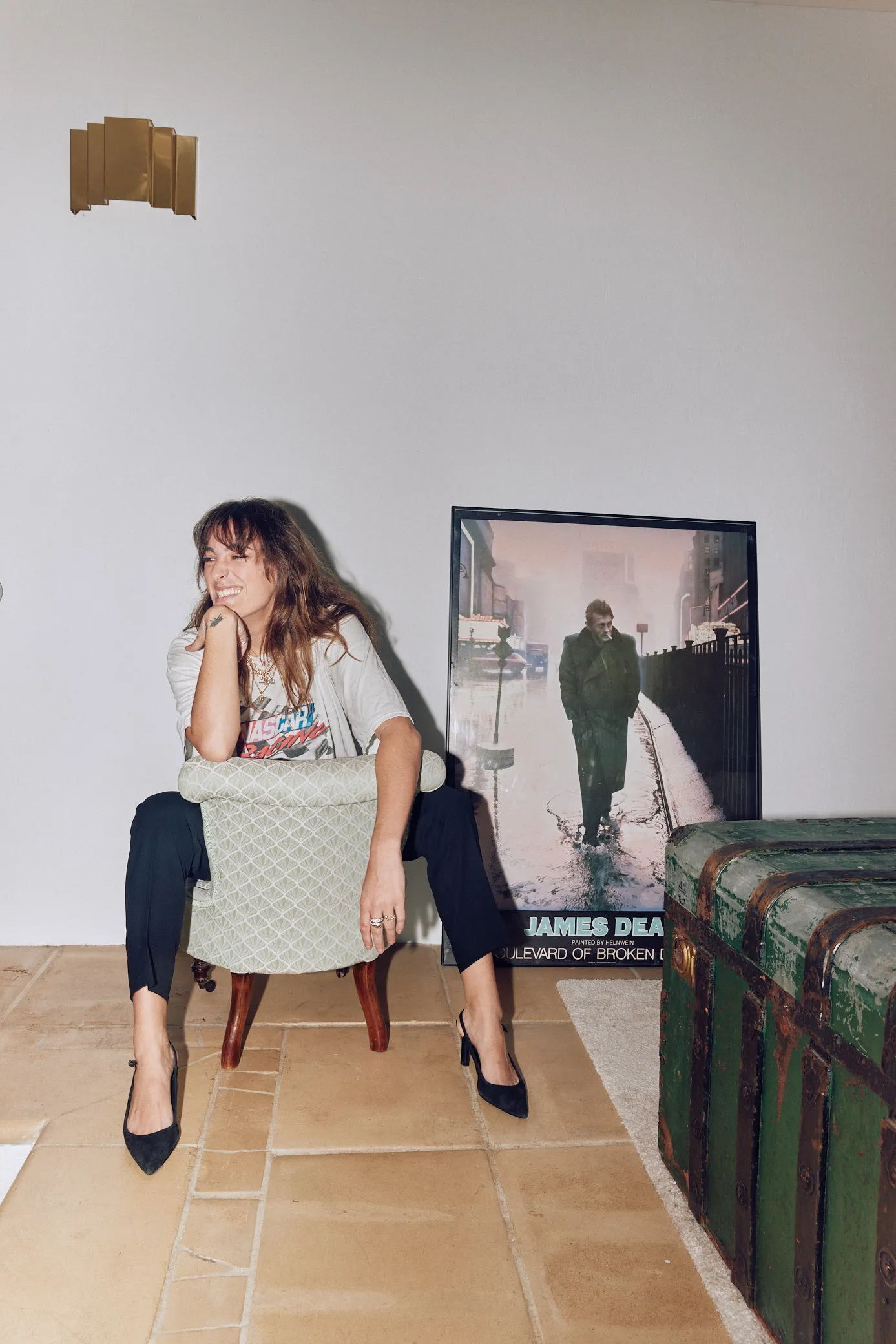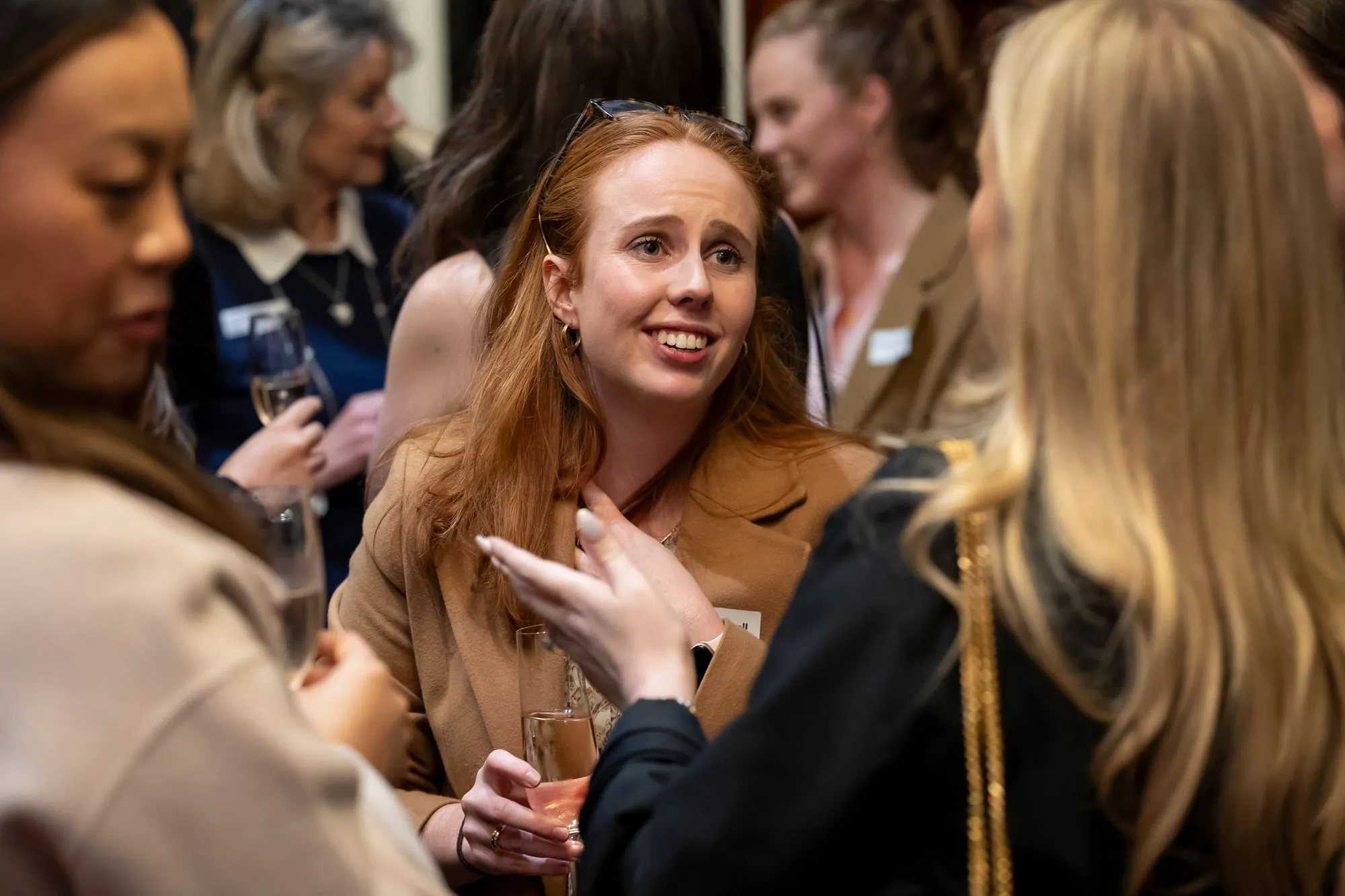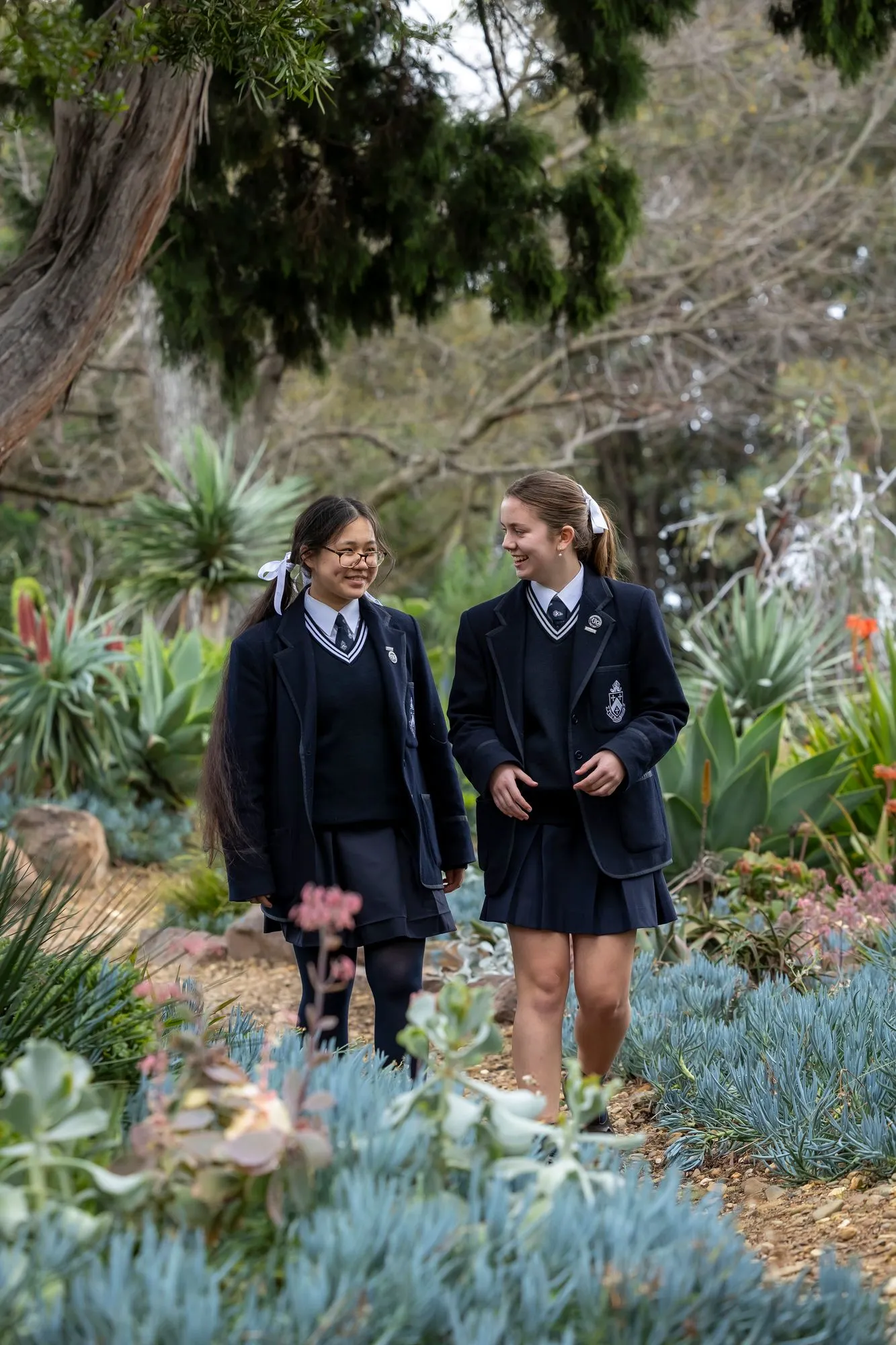

Maggie (Year 10) and Annabelle (Year 11) take a walk in the Royal Botanic Gardens after school.


Maggie (Year 10) and Annabelle (Year 11) take a walk in the Royal Botanic Gardens after school.
The Magic of Boarding
In the Boarding House at Melbourne Girls Grammar, our students are in an ideal, community-based environment where each boarder’s success and happiness is our focus.
Recently, we spoke with Director of Boarding – Amanda Haggie – to hear about how our boarders flourish in the boarding environment and how our Boarding House, its routines, and staff enable our boarders to perform at their best and manage their time effectively.

Do you notice a shift in the study habits of our Boarders once they hit VCE? How does the Boarding House facilitate better academic practices for students?
In Year 11 and 12, Amanda identified that “the boarders ‘kick into action’. Peer support is really strong, as you would expect; if someone is working hard, everyone is motivated to do their best, too.” She shared that they, “do study groups, share resources, and go to the Library together, or gather in the Study Room.” It’s infectious and seemingly a recipe for them to develop study habits through their peers modelling best practice.
"Peer support is really strong, as you would expect; if someone is working hard, everyone is motivated to do their best, too."
Do you notice a shift in the study habits of our Boarders once they hit VCE? How does the Boarding House facilitate better academic practices for students?
In Year 11 and 12, Amanda identified that “the boarders ‘kick into action’. Peer support is really strong, as you would expect; if someone is working hard, everyone is motivated to do their best, too.” She shared that they, “do study groups, share resources, and go to the Library together, or gather in the Study Room.” It’s infectious and seemingly a recipe for them to develop study habits through their peers modelling best practice.
"Peer support is really strong, as you would expect; if someone is working hard, everyone is motivated to do their best, too."
Do you notice a shift in the study habits of our Boarders once they hit VCE? How does the Boarding House facilitate better academic practices for students?
In Year 11 and 12, Amanda identified that “the boarders ‘kick into action’. Peer support is really strong, as you would expect; if someone is working hard, everyone is motivated to do their best, too.” She shared that they, “do study groups, share resources, and go to the Library together, or gather in the Study Room.” It’s infectious and seemingly a recipe for them to develop study habits through their peers modelling best practice.
"Peer support is really strong, as you would expect; if someone is working hard, everyone is motivated to do their best, too."
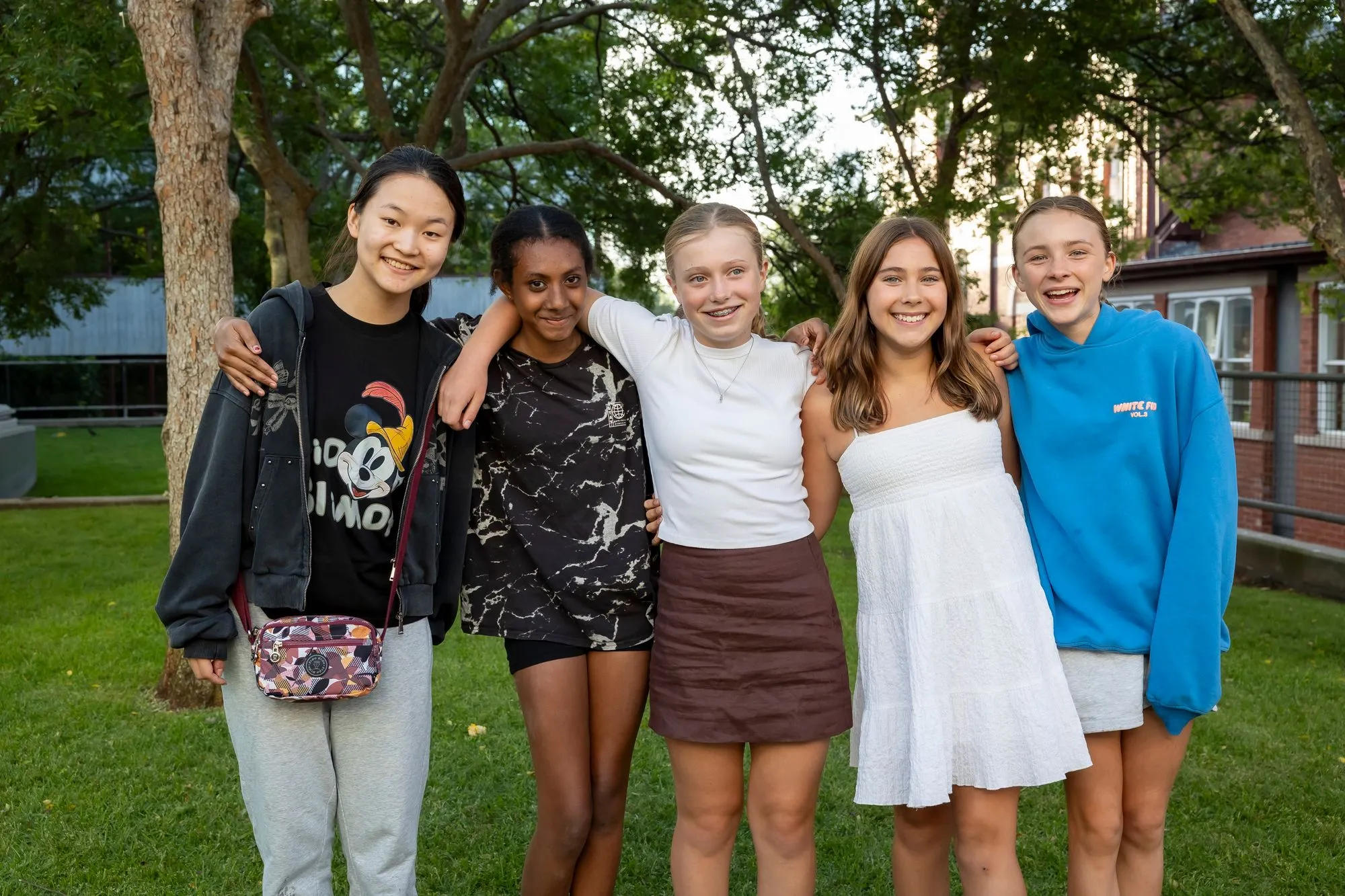

New Year 7 and 8 Boarders in February 2024!



New Year 7 and 8 Boarders in February 2024!
.webp)
.webp)
Director of Boarding, Amanda Haggie and Deputy Director of Boarding, Kerry Bacon with Year 12 Boarders in September 2023.
.webp)
.webp)
Residential Staff Member and Old Grammarian Henni Roxburgh (2018) assists with Prep in the Nina Crone Library.
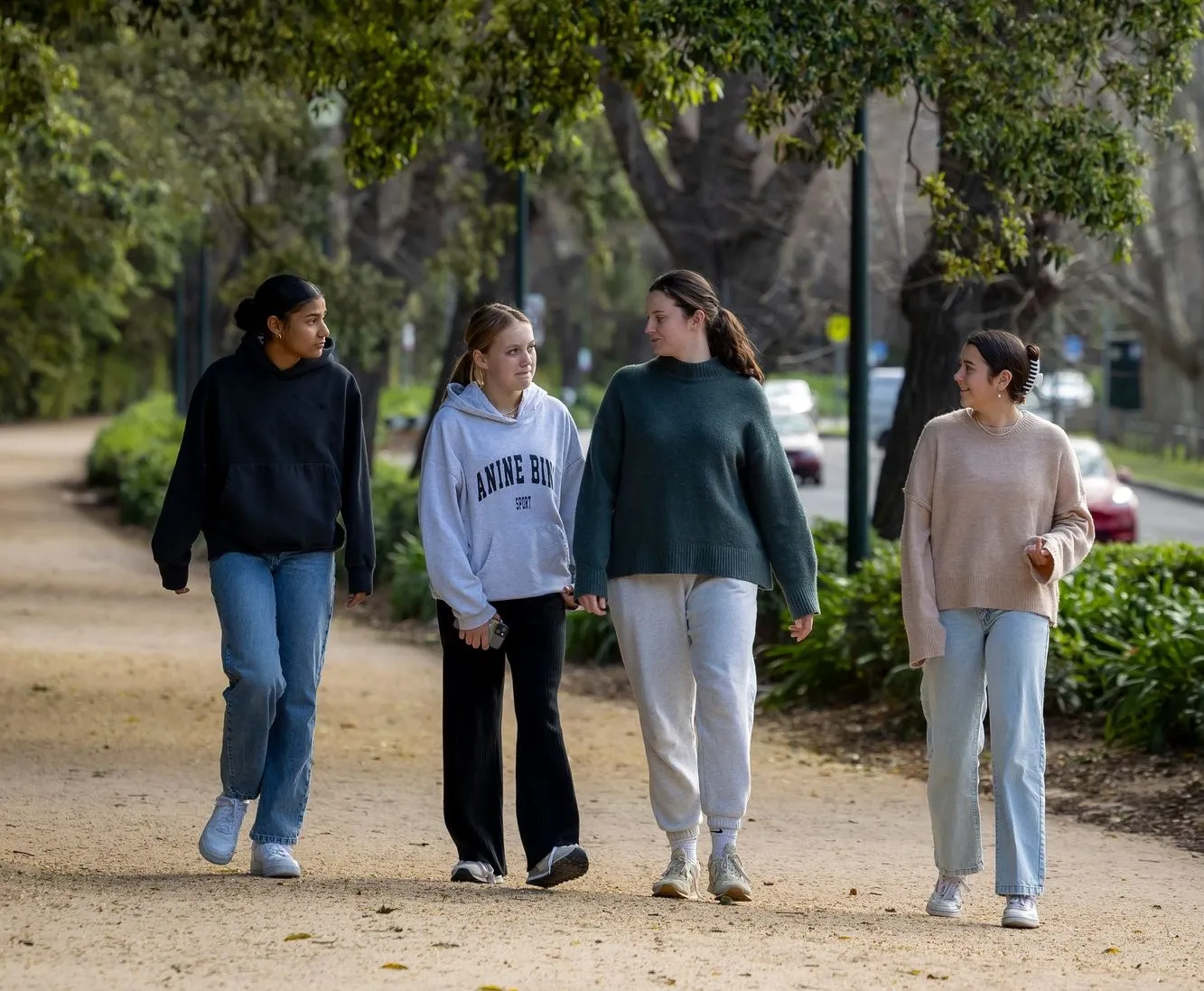

Sienna, Ivy, Olivia and Saskia take a stroll on The Tan near MGGS.

"The great thing is, if one of our girls is feeling less motivated, it’s a herd thing, so they get on with it because otherwise there’s no one to hang out with! I love walking into our different spaces – the Library classroom or our Study Room – and seeing heaps of stuff written on the whiteboard for a particular subject,” she said. “I can see there’s been a group of girls conferencing and getting through their work together. It’s seen as the thing to do, you know; they really ‘click in’ at Year 11 and 12.”
Our Year 9 and 10 students have a more structured schedule. They have set study time called ‘Prep’ between 6.30 pm and 8/8.30 pm in the Nina Crone Library each evening. Amanda shared that on Mondays and Tuesdays, “we invite a couple of the School’s academic coaches to Prep as well, usually ones with strengths in STEM subjects such as Mathematics, Science, Chemistry and Physics. They’re the subjects that our boarders like to have extra support for.”
She also noted that, “when our boarders reach Year 11 and Year 12, we give them more freedom and the chance to self-motivate and manage their time, which is a good progression for going to university.”
"The great thing is, if one of our girls is feeling less motivated, it’s a herd thing, so they get on with it because otherwise there’s no one to hang out with! I love walking into our different spaces – the Library classroom or our Study Room – and seeing heaps of stuff written on the whiteboard for a particular subject,” she said. “I can see there’s been a group of girls conferencing and getting through their work together. It’s seen as the thing to do, you know; they really ‘click in’ at Year 11 and 12.”
Our Year 9 and 10 students have a more structured schedule. They have set study time called ‘Prep’ between 6.30 pm and 8/8.30 pm in the Nina Crone Library each evening. Amanda shared that on Mondays and Tuesdays, “we invite a couple of the School’s academic coaches to Prep as well, usually ones with strengths in STEM subjects such as Mathematics, Science, Chemistry and Physics. They’re the subjects that our boarders like to have extra support for.”
She also noted that, “when our boarders reach Year 11 and Year 12, we give them more freedom and the chance to self-motivate and manage their time, which is a good progression for going to university.”
"The great thing is, if one of our girls is feeling less motivated, it’s a herd thing, so they get on with it because otherwise there’s no one to hang out with! I love walking into our different spaces – the Library classroom or our Study Room – and seeing heaps of stuff written on the whiteboard for a particular subject,” she said. “I can see there’s been a group of girls conferencing and getting through their work together. It’s seen as the thing to do, you know; they really ‘click in’ at Year 11 and 12.”
Our Year 9 and 10 students have a more structured schedule. They have set study time called ‘Prep’ between 6.30 pm and 8/8.30 pm in the Nina Crone Library each evening. Amanda shared that on Mondays and Tuesdays, “we invite a couple of the School’s academic coaches to Prep as well, usually ones with strengths in STEM subjects such as Mathematics, Science, Chemistry and Physics. They’re the subjects that our boarders like to have extra support for.”
She also noted that, “when our boarders reach Year 11 and Year 12, we give them more freedom and the chance to self-motivate and manage their time, which is a good progression for going to university.”
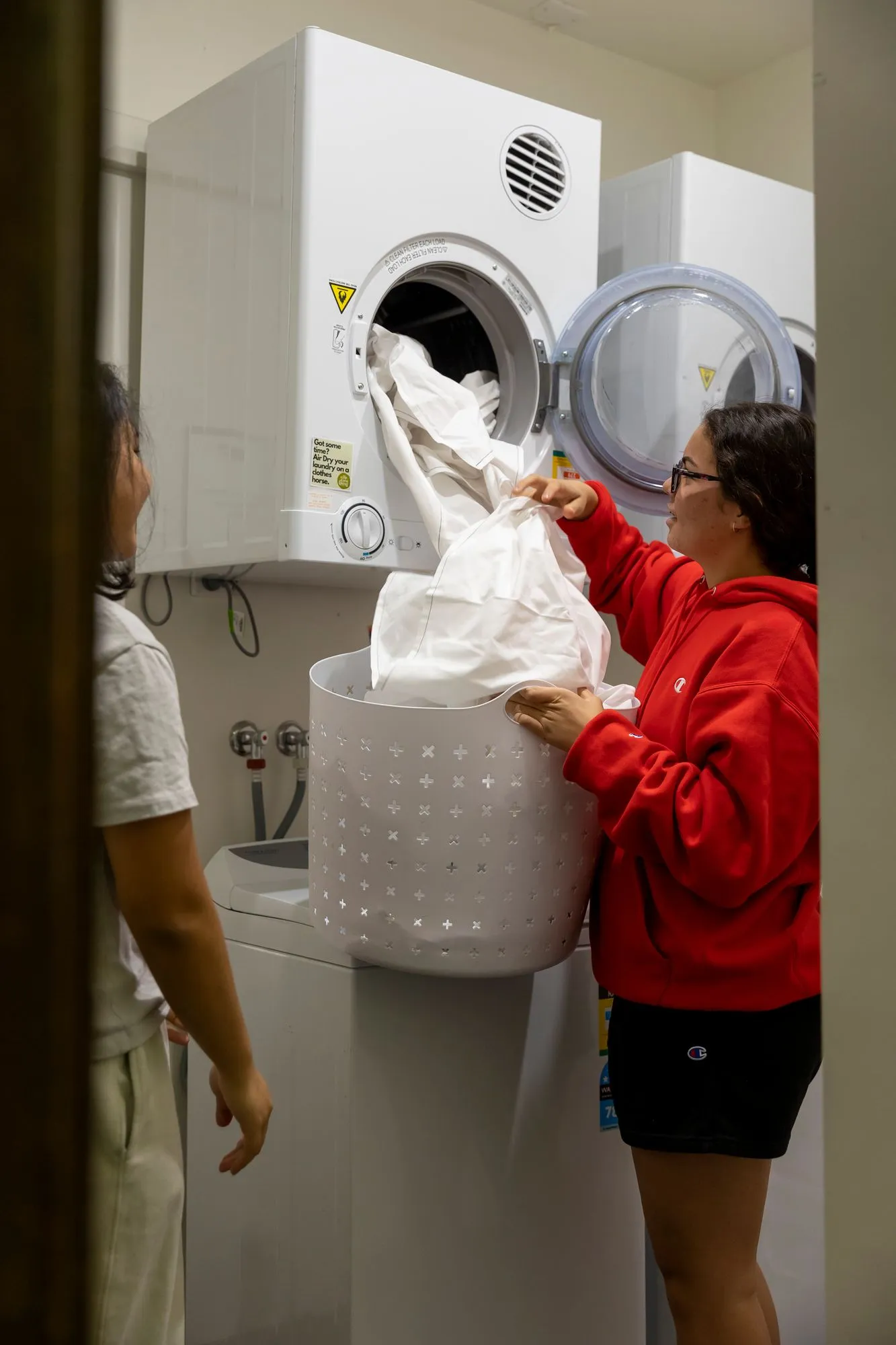

Boarders build their independence, taking care of their laundry.



Boarders build their independence, taking care of their laundry.
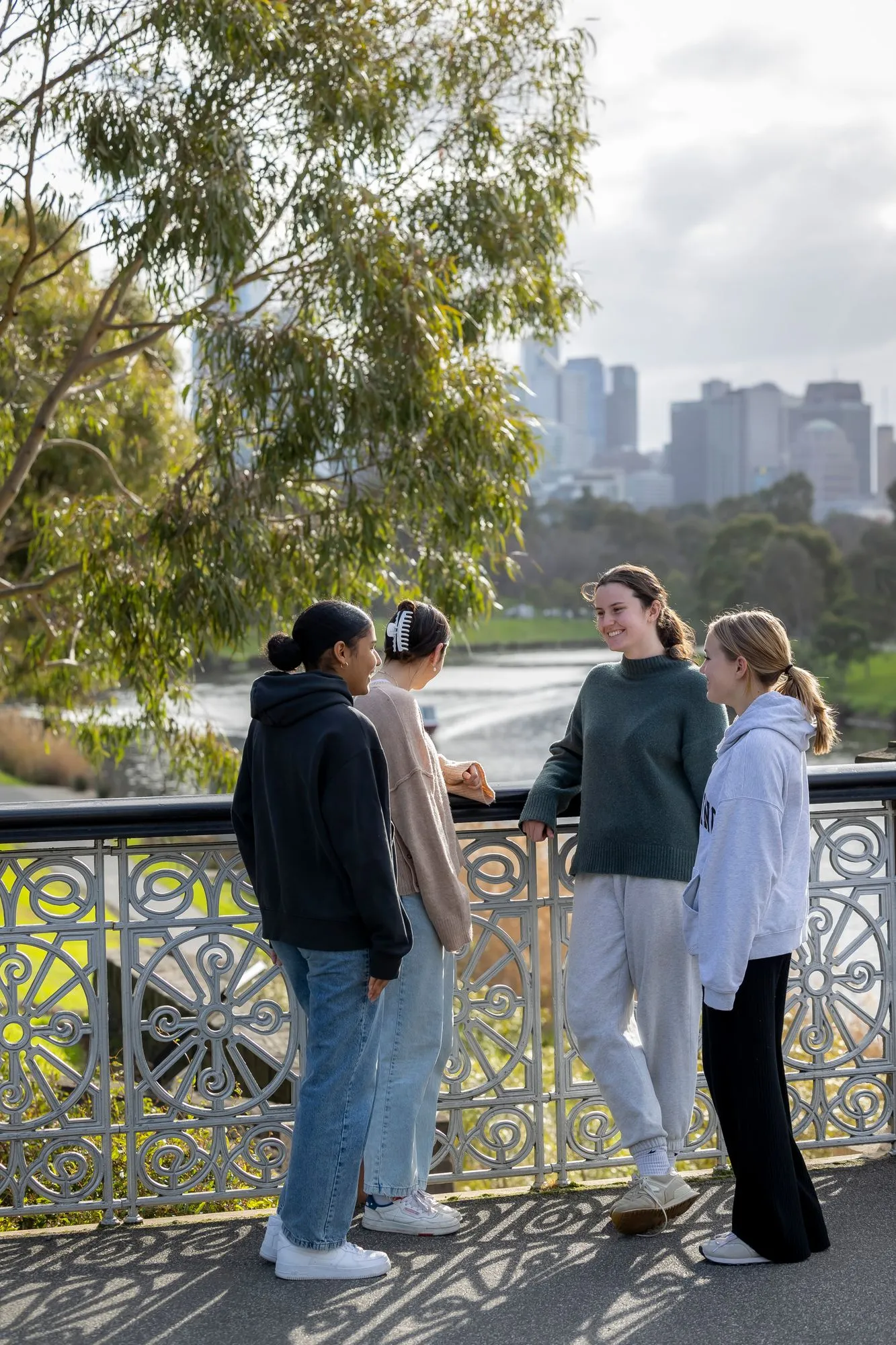

Boarders exploring Melbourne, our proximity to the Royal Botanic Gardens, the MCG and the Yarra River provides many opportunities for exercise, fun and adventure!


Boarders build their independence, taking care of their laundry.


Boarders exploring Melbourne, our proximity to the Royal Botanic Gardens, the MCG and the Yarra River provides many opportunities for exercise, fun and adventure!

Does having extra access to the School and its facilities and resources encourage students to join the Boarding House at VCE level?
“Yes, absolutely. Access to the Library is fantastic for the boarders. We are able to use the Artemis Centre as well and sometimes students might want to go do a gym session after dinner to get themselves motivated. Girls also use The Tan track a lot, so being across the road from the Royal Botanic Gardens is a huge plus. It’s great for them to go and clear their heads, come back and settle into some more study.”
What also really helps our Senior Years students focus that little bit extra, is being on campus. "They don't have to worry about the commute time to and from school.” Amanda has noticed that it also helps with motivation. She said, “if you’re living here, you can look out the window and you’re here, there’s no hesitation involved with getting to school each day, and on time.”
How do you see the boarders develop self-management skills, like resilience and independence through being responsible for themselves and their study?
Amanda believes that the key thing here is learning to manage their time. She explained that each evening the boarders have to eat, do their washing, study, fit in their co-curricular activities, appointments, and exercise..."They have to manage it all!”
In Year 10 and below, it’s a bit more prescriptive. Amanda shared that she’ll say, “Right, it’s sheet change tonight. Everyone needs to have done their washing,” or “We’re heading off to Prep now.” We learned that, fundamentally, life for the younger students is more structured. She goes on to say that, “after that it just sort of happens; they just click into it.”
Accommodation in the Boarding House changes between age groups. “The number in each room goes down from four in a room at Year 9, to two in Years 10 and 11. And they get to choose who they room with,” she explained. “I’ve noticed boarders who tend to study at night might pick a roommate who does the same, or if they like to get up early for sport training or exercise, they’ll choose someone with a similar schedule.”
Distractions from technology are carefully regulated in the Boarding House. The younger students are required to lock their devices away in a set storage space in the Boarding House, so they are able to get the valuable and necessary sleep time required of growing bodies. This responsibility shifts when the boarders get older. Amanda explains that “the Year 11s and 12s are really great at managing their device time and the mere fact that they don’t have to hand them in, means they really don’t over-use them. Year 10s, however…well, they’ll try anything!” she exclaims, with the knowing smirk of a Boarding House ‘mother’ who knows all the tricks.
“I think it’s really special to watch these transitions happen as each boarder matures and grows. As they get older, they understand their responsibilities, and step up to be leaders and role models in the House. If you’re not one of those people, you really stand out.”
Does having extra access to the School and its facilities and resources encourage students to join the Boarding House at VCE level?
“Yes, absolutely. Access to the Library is fantastic for the boarders. We are able to use the Artemis Centre as well and sometimes students might want to go do a gym session after dinner to get themselves motivated. Girls also use The Tan track a lot, so being across the road from the Royal Botanic Gardens is a huge plus. It’s great for them to go and clear their heads, come back and settle into some more study.”
What also really helps our Senior Years students focus that little bit extra, is being on campus. "They don't have to worry about the commute time to and from school.” Amanda has noticed that it also helps with motivation. She said, “if you’re living here, you can look out the window and you’re here, there’s no hesitation involved with getting to school each day, and on time.”
How do you see the boarders develop self-management skills, like resilience and independence through being responsible for themselves and their study?
Amanda believes that the key thing here is learning to manage their time. She explained that each evening the boarders have to eat, do their washing, study, fit in their co-curricular activities, appointments, and exercise..."They have to manage it all!”
In Year 10 and below, it’s a bit more prescriptive. Amanda shared that she’ll say, “Right, it’s sheet change tonight. Everyone needs to have done their washing,” or “We’re heading off to Prep now.” We learned that, fundamentally, life for the younger students is more structured. She goes on to say that, “after that it just sort of happens; they just click into it.”
Accommodation in the Boarding House changes between age groups. “The number in each room goes down from four in a room at Year 9, to two in Years 10 and 11. And they get to choose who they room with,” she explained. “I’ve noticed boarders who tend to study at night might pick a roommate who does the same, or if they like to get up early for sport training or exercise, they’ll choose someone with a similar schedule.”
Distractions from technology are carefully regulated in the Boarding House. The younger students are required to lock their devices away in a set storage space in the Boarding House, so they are able to get the valuable and necessary sleep time required of growing bodies. This responsibility shifts when the boarders get older. Amanda explains that “the Year 11s and 12s are really great at managing their device time and the mere fact that they don’t have to hand them in, means they really don’t over-use them. Year 10s, however…well, they’ll try anything!” she exclaims, with the knowing smirk of a Boarding House ‘mother’ who knows all the tricks.
“I think it’s really special to watch these transitions happen as each boarder matures and grows. As they get older, they understand their responsibilities, and step up to be leaders and role models in the House. If you’re not one of those people, you really stand out.”
Does having extra access to the School and its facilities and resources encourage students to join the Boarding House at VCE level?
“Yes, absolutely. Access to the Library is fantastic for the boarders. We are able to use the Artemis Centre as well and sometimes students might want to go do a gym session after dinner to get themselves motivated. Girls also use The Tan track a lot, so being across the road from the Royal Botanic Gardens is a huge plus. It’s great for them to go and clear their heads, come back and settle into some more study.”
What also really helps our Senior Years students focus that little bit extra, is being on campus. "They don't have to worry about the commute time to and from school.” Amanda has noticed that it also helps with motivation. She said, “if you’re living here, you can look out the window and you’re here, there’s no hesitation involved with getting to school each day, and on time.”
How do you see the boarders develop self-management skills, like resilience and independence through being responsible for themselves and their study?
Amanda believes that the key thing here is learning to manage their time. She explained that each evening the boarders have to eat, do their washing, study, fit in their co-curricular activities, appointments, and exercise..."They have to manage it all!”
In Year 10 and below, it’s a bit more prescriptive. Amanda shared that she’ll say, “Right, it’s sheet change tonight. Everyone needs to have done their washing,” or “We’re heading off to Prep now.” We learned that, fundamentally, life for the younger students is more structured. She goes on to say that, “after that it just sort of happens; they just click into it.”
Accommodation in the Boarding House changes between age groups. “The number in each room goes down from four in a room at Year 9, to two in Years 10 and 11. And they get to choose who they room with,” she explained. “I’ve noticed boarders who tend to study at night might pick a roommate who does the same, or if they like to get up early for sport training or exercise, they’ll choose someone with a similar schedule.”
Distractions from technology are carefully regulated in the Boarding House. The younger students are required to lock their devices away in a set storage space in the Boarding House, so they are able to get the valuable and necessary sleep time required of growing bodies. This responsibility shifts when the boarders get older. Amanda explains that “the Year 11s and 12s are really great at managing their device time and the mere fact that they don’t have to hand them in, means they really don’t over-use them. Year 10s, however…well, they’ll try anything!” she exclaims, with the knowing smirk of a Boarding House ‘mother’ who knows all the tricks.
“I think it’s really special to watch these transitions happen as each boarder matures and grows. As they get older, they understand their responsibilities, and step up to be leaders and role models in the House. If you’re not one of those people, you really stand out.”

What is the best advantage of this? Where do you see this difference in your boarders in day-to-day life?
Amanda explains that MGGS boarders learn how to manage their schedule, and specifically their study, early on. She says the difference between boarders and other students is most evident “when we go on camps or overseas trips. The boarders are used to organising themselves and are okay with being out of their comfort zones, so they can easily adjust and adapt.
"It is such a massive skillset they are developing, especially when it comes to their transition to university or college. For boarders, it seems to be so much easier than for others who have come from home, to make the adjustment to an independent way of living,” she confesses.
How does the Boarding House support the boarders to monitor and maintain their mental and physical wellbeing, in terms of exercise, eating well, taking quiet time out for reflection or ‘me’ time?
Amanda believes, “they’re pretty good at doing that. Interestingly, it will often be their peers who will come and speak to us if maybe someone isn’t doing so well, which is so awesome. They might say, 'Oh, so and so has been a bit quiet,' or, 'I’m a bit worried about such and such'. Between our staff, we are good at communicating this sort of thing,” she adds.
“When we [the Boarding House] are together as a group, say, at Dinner Announcements, we have a lot of laughter and a lot of fun. It is a time to come together as a little community, so we 'check in' then as well. We gauge how everyone is feeling.”
Amanda firmly believes this to be one of the strengths of the MGGS Boarding House and feels it all stems from the fact that they know the individual boarders well. “They don’t just walk in the door after school and go up to their room”, she shares. “They’re people, and we know them; we live with them. When they are down or stressed, we know what they might need. One of us might give them a tap on the shoulder and say, ‘Come on, let’s go for a walk,’ or, ‘Should we go for a Yochi trip?’ or, ‘Let’s not do Prep in the Library tonight, it’s a sunny day, let’s go outside and have an ice block.’ That sort of thing."
Clearly, the staff know when there’s a change in an individual’s wellbeing. She adds, “we always keep our communication open, so whoever is on duty is aware of the relevant issues. It’s what keeps our community strong.”
Similarly, is there anything specific that the Boarding House does to support students completing VCE? How do the girls manage the challenges and stresses that come along with the final two years of school?
Amanda admits that doing VCE can be challenging and stressful for anyone, but indicates that there’s a lot of support provided to each individual boarder under their care. “The main thing is, we employ the right people. We aim to employ Residential Boarding Staff or ‘Resis’ who have been through VCE relatively recently,” she shares. She feels that this facilitates greater empathy with the students as these Resis know what it is like to live away from home, can spot signs of stress early, and intervene with the best support to fit the situation. “They’re really happy to sit with our VCE students and debrief, or offer suggestions or advice”, she said. “Our staff know when someone might have an important test, SAC or essay due.” She gave an example of when there was a big English SAC recently, and so when the Year 12s all came ‘home’, the Resis were waiting to ask how it went. “'Did you nail your quotes?', 'What was your opinion piece?' All that. It’s because they’re invested, and they care, and they’re here,” she shared.
"We employ the right people...‘Resis’ who have been through VCE relatively recently [and who]...know what it is like to live away from home, can spot signs of stress early and intervene with the best support to fit the situation."
She went on to say, “Often, it’s a case of...the girls will walk in the front door and literally drop their bags at our office door and either go, 'Oh, that was amazing!' or they have ‘a wobble’. It is organic and our Resis are here for them, and they enjoy being able to help all the students.”
What is the best advantage of this? Where do you see this difference in your boarders in day-to-day life?
Amanda explains that MGGS boarders learn how to manage their schedule, and specifically their study, early on. She says the difference between boarders and other students is most evident “when we go on camps or overseas trips. The boarders are used to organising themselves and are okay with being out of their comfort zones, so they can easily adjust and adapt.
"It is such a massive skillset they are developing, especially when it comes to their transition to university or college. For boarders, it seems to be so much easier than for others who have come from home, to make the adjustment to an independent way of living,” she confesses.
How does the Boarding House support the boarders to monitor and maintain their mental and physical wellbeing, in terms of exercise, eating well, taking quiet time out for reflection or ‘me’ time?
Amanda believes, “they’re pretty good at doing that. Interestingly, it will often be their peers who will come and speak to us if maybe someone isn’t doing so well, which is so awesome. They might say, 'Oh, so and so has been a bit quiet,' or, 'I’m a bit worried about such and such'. Between our staff, we are good at communicating this sort of thing,” she adds.
“When we [the Boarding House] are together as a group, say, at Dinner Announcements, we have a lot of laughter and a lot of fun. It is a time to come together as a little community, so we 'check in' then as well. We gauge how everyone is feeling.”
Amanda firmly believes this to be one of the strengths of the MGGS Boarding House and feels it all stems from the fact that they know the individual boarders well. “They don’t just walk in the door after school and go up to their room”, she shares. “They’re people, and we know them; we live with them. When they are down or stressed, we know what they might need. One of us might give them a tap on the shoulder and say, ‘Come on, let’s go for a walk,’ or, ‘Should we go for a Yochi trip?’ or, ‘Let’s not do Prep in the Library tonight, it’s a sunny day, let’s go outside and have an ice block.’ That sort of thing."
Clearly, the staff know when there’s a change in an individual’s wellbeing. She adds, “we always keep our communication open, so whoever is on duty is aware of the relevant issues. It’s what keeps our community strong.”
Similarly, is there anything specific that the Boarding House does to support students completing VCE? How do the girls manage the challenges and stresses that come along with the final two years of school?
Amanda admits that doing VCE can be challenging and stressful for anyone, but indicates that there’s a lot of support provided to each individual boarder under their care. “The main thing is, we employ the right people. We aim to employ Residential Boarding Staff or ‘Resis’ who have been through VCE relatively recently,” she shares. She feels that this facilitates greater empathy with the students as these Resis know what it is like to live away from home, can spot signs of stress early, and intervene with the best support to fit the situation. “They’re really happy to sit with our VCE students and debrief, or offer suggestions or advice”, she said. “Our staff know when someone might have an important test, SAC or essay due.” She gave an example of when there was a big English SAC recently, and so when the Year 12s all came ‘home’, the Resis were waiting to ask how it went. “'Did you nail your quotes?', 'What was your opinion piece?' All that. It’s because they’re invested, and they care, and they’re here,” she shared.
"We employ the right people...‘Resis’ who have been through VCE relatively recently [and who]...know what it is like to live away from home, can spot signs of stress early and intervene with the best support to fit the situation."
She went on to say, “Often, it’s a case of...the girls will walk in the front door and literally drop their bags at our office door and either go, 'Oh, that was amazing!' or they have ‘a wobble’. It is organic and our Resis are here for them, and they enjoy being able to help all the students.”
What is the best advantage of this? Where do you see this difference in your boarders in day-to-day life?
Amanda explains that MGGS boarders learn how to manage their schedule, and specifically their study, early on. She says the difference between boarders and other students is most evident “when we go on camps or overseas trips. The boarders are used to organising themselves and are okay with being out of their comfort zones, so they can easily adjust and adapt.
"It is such a massive skillset they are developing, especially when it comes to their transition to university or college. For boarders, it seems to be so much easier than for others who have come from home, to make the adjustment to an independent way of living,” she confesses.
How does the Boarding House support the boarders to monitor and maintain their mental and physical wellbeing, in terms of exercise, eating well, taking quiet time out for reflection or ‘me’ time?
Amanda believes, “they’re pretty good at doing that. Interestingly, it will often be their peers who will come and speak to us if maybe someone isn’t doing so well, which is so awesome. They might say, 'Oh, so and so has been a bit quiet,' or, 'I’m a bit worried about such and such'. Between our staff, we are good at communicating this sort of thing,” she adds.
“When we [the Boarding House] are together as a group, say, at Dinner Announcements, we have a lot of laughter and a lot of fun. It is a time to come together as a little community, so we 'check in' then as well. We gauge how everyone is feeling.”
Amanda firmly believes this to be one of the strengths of the MGGS Boarding House and feels it all stems from the fact that they know the individual boarders well. “They don’t just walk in the door after school and go up to their room”, she shares. “They’re people, and we know them; we live with them. When they are down or stressed, we know what they might need. One of us might give them a tap on the shoulder and say, ‘Come on, let’s go for a walk,’ or, ‘Should we go for a Yochi trip?’ or, ‘Let’s not do Prep in the Library tonight, it’s a sunny day, let’s go outside and have an ice block.’ That sort of thing."
Clearly, the staff know when there’s a change in an individual’s wellbeing. She adds, “we always keep our communication open, so whoever is on duty is aware of the relevant issues. It’s what keeps our community strong.”
Similarly, is there anything specific that the Boarding House does to support students completing VCE? How do the girls manage the challenges and stresses that come along with the final two years of school?
Amanda admits that doing VCE can be challenging and stressful for anyone, but indicates that there’s a lot of support provided to each individual boarder under their care. “The main thing is, we employ the right people. We aim to employ Residential Boarding Staff or ‘Resis’ who have been through VCE relatively recently,” she shares. She feels that this facilitates greater empathy with the students as these Resis know what it is like to live away from home, can spot signs of stress early, and intervene with the best support to fit the situation. “They’re really happy to sit with our VCE students and debrief, or offer suggestions or advice”, she said. “Our staff know when someone might have an important test, SAC or essay due.” She gave an example of when there was a big English SAC recently, and so when the Year 12s all came ‘home’, the Resis were waiting to ask how it went. “'Did you nail your quotes?', 'What was your opinion piece?' All that. It’s because they’re invested, and they care, and they’re here,” she shared.
"We employ the right people...‘Resis’ who have been through VCE relatively recently [and who]...know what it is like to live away from home, can spot signs of stress early and intervene with the best support to fit the situation."
She went on to say, “Often, it’s a case of...the girls will walk in the front door and literally drop their bags at our office door and either go, 'Oh, that was amazing!' or they have ‘a wobble’. It is organic and our Resis are here for them, and they enjoy being able to help all the students.”

On entry to the Boarding House, Amanda and Kerry (Deputy Director of Boarding) can be found in their shared office. It is a bright and open space with a sofa and small table. Importantly, they have developed an open-door policy. “When the doors are open, our boarders can come in and have a chat like they would returning home after a busy day and debriefing with their family,” she said. “This is where a lot of our support happens. Students may come in and say, ‘Oh, I didn’t do so well in my SAC today...’ With a ready supply of tissues, if needed, we sit, we talk, we laugh, we offer suggestions to help find the right way forward for the student.” She was also quick to add that, “we also link in closely with the House Wellbeing Co-ordinators and Lily [the Senior Years Counsellor]. If there is an issue with one of our girls, we can flag it and keep a close eye on them.”
It is clear to students and staff (even outside the Boarding House) that as Director of Boarding, Amanda's strength is in the area of wellbeing [in former times referred to as pastoral care]. This feeds into how the rest of the Boarding House functions, it’s a culture of respect for individuals but also a place where people genuinely feel cared for and supported.
On entry to the Boarding House, Amanda and Kerry (Deputy Director of Boarding) can be found in their shared office. It is a bright and open space with a sofa and small table. Importantly, they have developed an open-door policy. “When the doors are open, our boarders can come in and have a chat like they would returning home after a busy day and debriefing with their family,” she said. “This is where a lot of our support happens. Students may come in and say, ‘Oh, I didn’t do so well in my SAC today...’ With a ready supply of tissues, if needed, we sit, we talk, we laugh, we offer suggestions to help find the right way forward for the student.” She was also quick to add that, “we also link in closely with the House Wellbeing Co-ordinators and Lily [the Senior Years Counsellor]. If there is an issue with one of our girls, we can flag it and keep a close eye on them.”
It is clear to students and staff (even outside the Boarding House) that as Director of Boarding, Amanda's strength is in the area of wellbeing [in former times referred to as pastoral care]. This feeds into how the rest of the Boarding House functions, it’s a culture of respect for individuals but also a place where people genuinely feel cared for and supported.
On entry to the Boarding House, Amanda and Kerry (Deputy Director of Boarding) can be found in their shared office. It is a bright and open space with a sofa and small table. Importantly, they have developed an open-door policy. “When the doors are open, our boarders can come in and have a chat like they would returning home after a busy day and debriefing with their family,” she said. “This is where a lot of our support happens. Students may come in and say, ‘Oh, I didn’t do so well in my SAC today...’ With a ready supply of tissues, if needed, we sit, we talk, we laugh, we offer suggestions to help find the right way forward for the student.” She was also quick to add that, “we also link in closely with the House Wellbeing Co-ordinators and Lily [the Senior Years Counsellor]. If there is an issue with one of our girls, we can flag it and keep a close eye on them.”
It is clear to students and staff (even outside the Boarding House) that as Director of Boarding, Amanda's strength is in the area of wellbeing [in former times referred to as pastoral care]. This feeds into how the rest of the Boarding House functions, it’s a culture of respect for individuals but also a place where people genuinely feel cared for and supported.
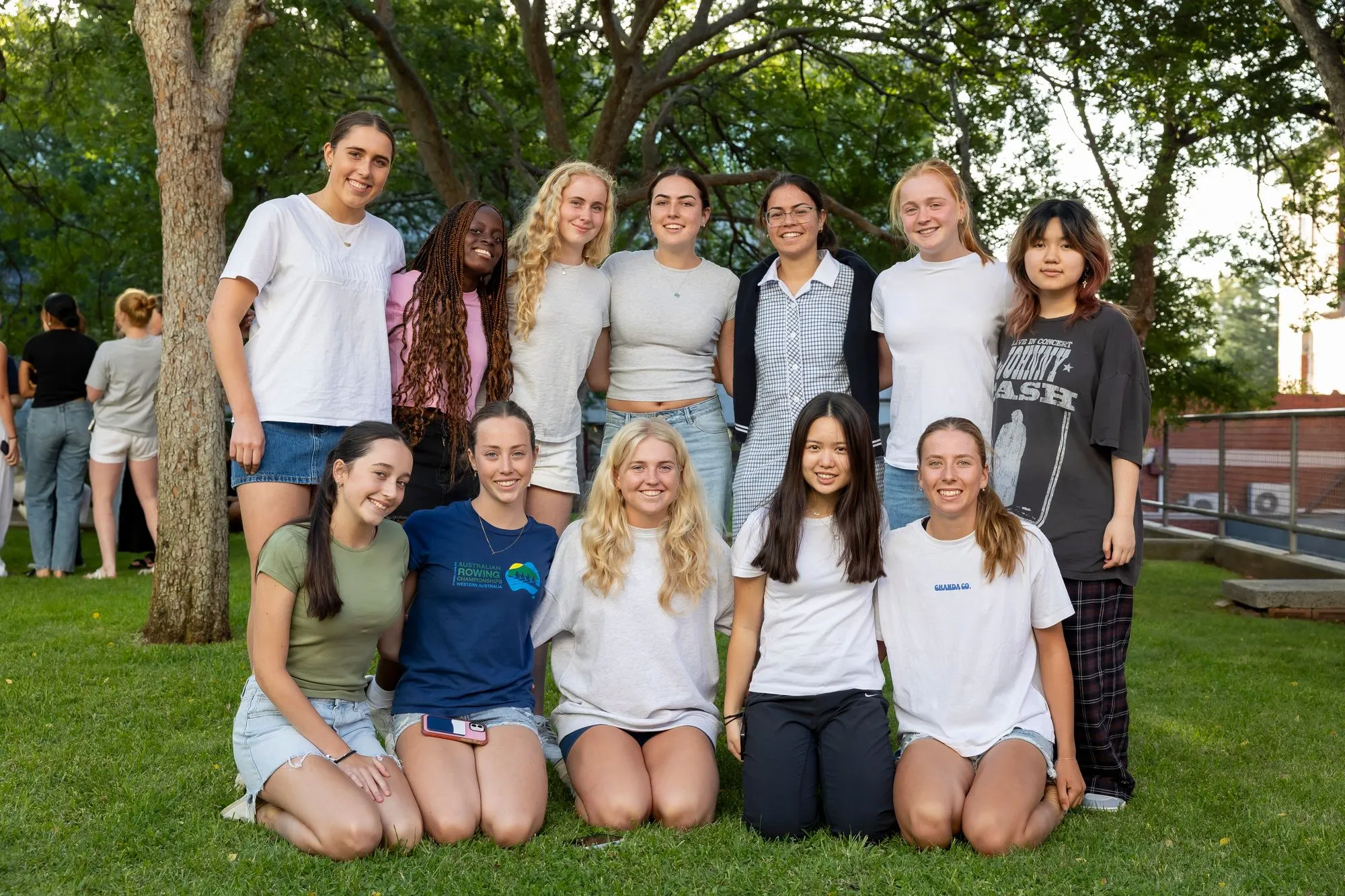




Year 11 and 12 students are important role models in the Boarding House.


Year 11 and 12 students are important role models in the Boarding House.

Our Boarding House is an inclusive and welcoming environment that has enabled generations of Grammarians to build the confidence, knowledge and skills needed to run their own race in life. If the walls could talk, they would have many wonderful stories to tell of the lives and adventures of the hundreds of Grammarians who have called the Boarding House 'home' at some stage in their adolescent years. Each resident has ridden the highs and lows of living away from home, but the benefits of having a large support network, independence and friends for life has never been underestimated.
Our Boarding House is an inclusive and welcoming environment that has enabled generations of Grammarians to build the confidence, knowledge and skills needed to run their own race in life. If the walls could talk, they would have many wonderful stories to tell of the lives and adventures of the hundreds of Grammarians who have called the Boarding House 'home' at some stage in their adolescent years. Each resident has ridden the highs and lows of living away from home, but the benefits of having a large support network, independence and friends for life has never been underestimated.
Our Boarding House is an inclusive and welcoming environment that has enabled generations of Grammarians to build the confidence, knowledge and skills needed to run their own race in life. If the walls could talk, they would have many wonderful stories to tell of the lives and adventures of the hundreds of Grammarians who have called the Boarding House 'home' at some stage in their adolescent years. Each resident has ridden the highs and lows of living away from home, but the benefits of having a large support network, independence and friends for life has never been underestimated.





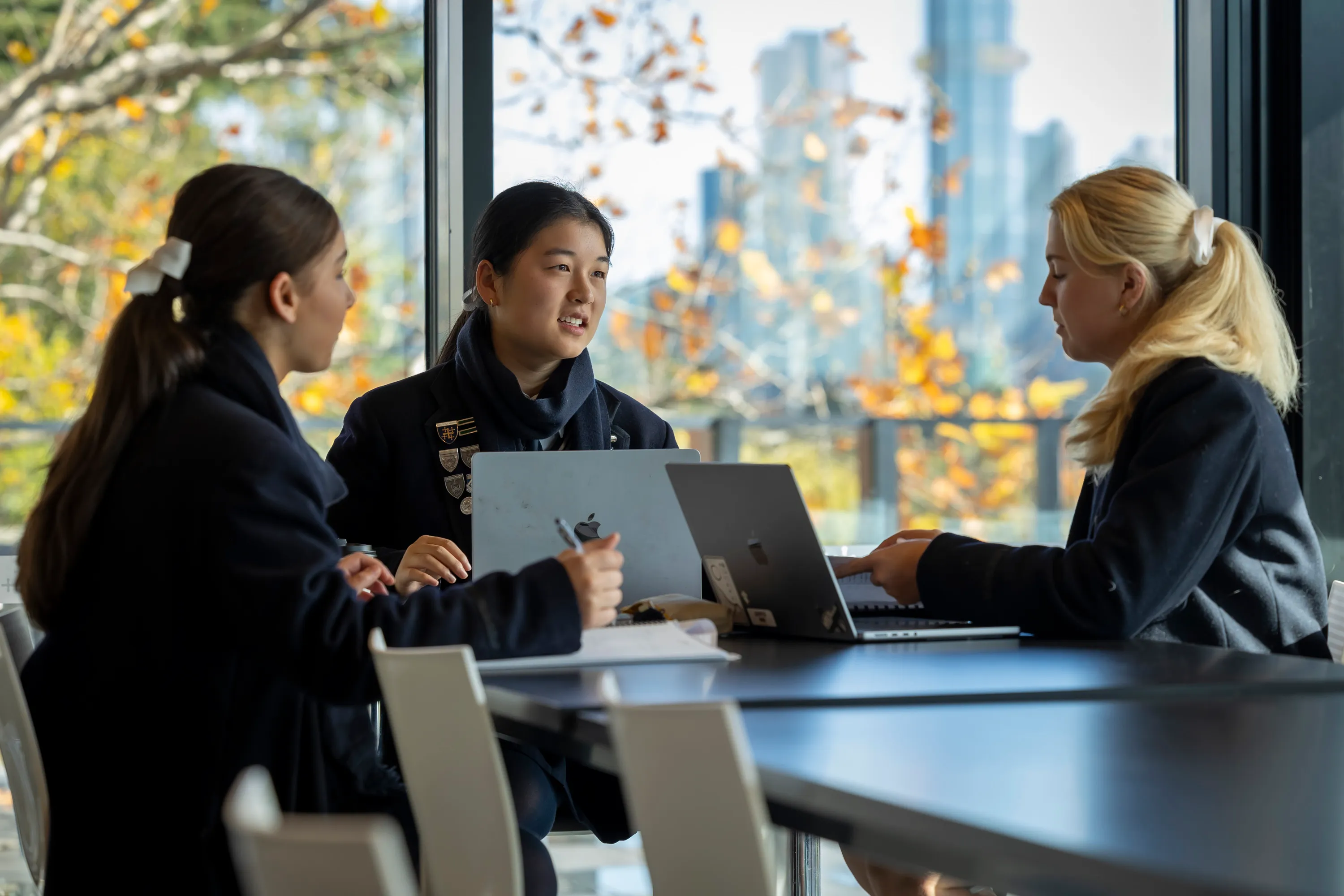


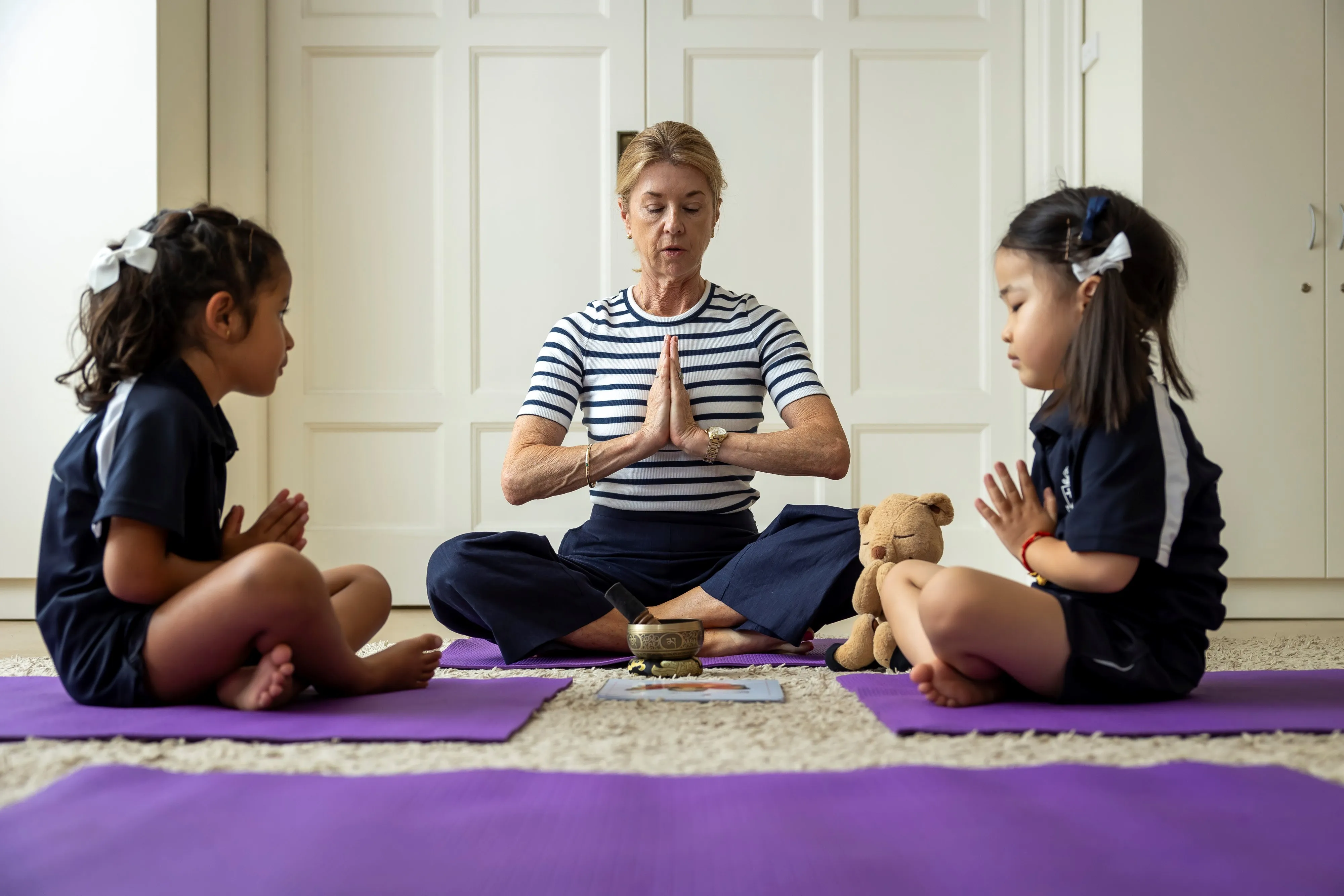
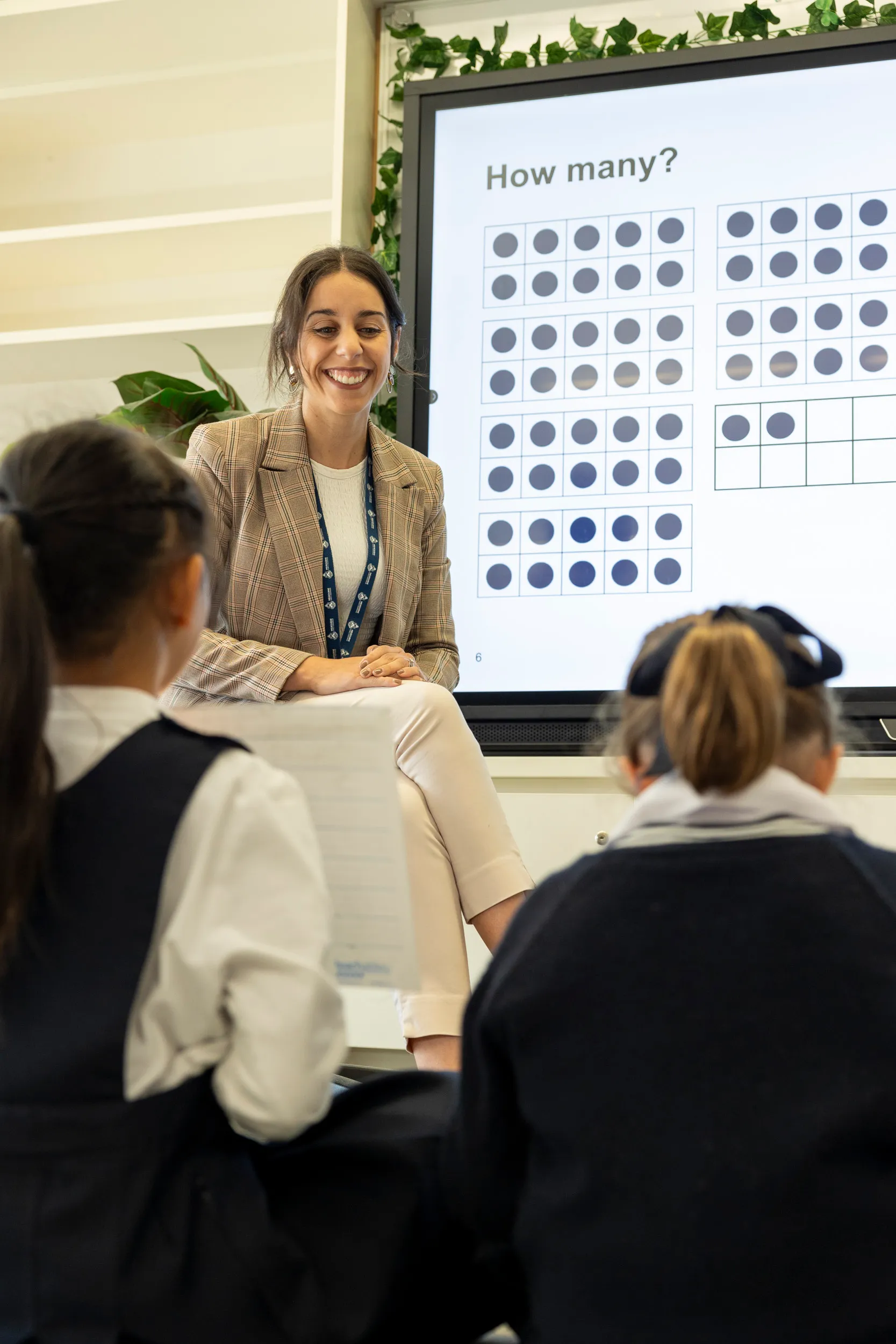
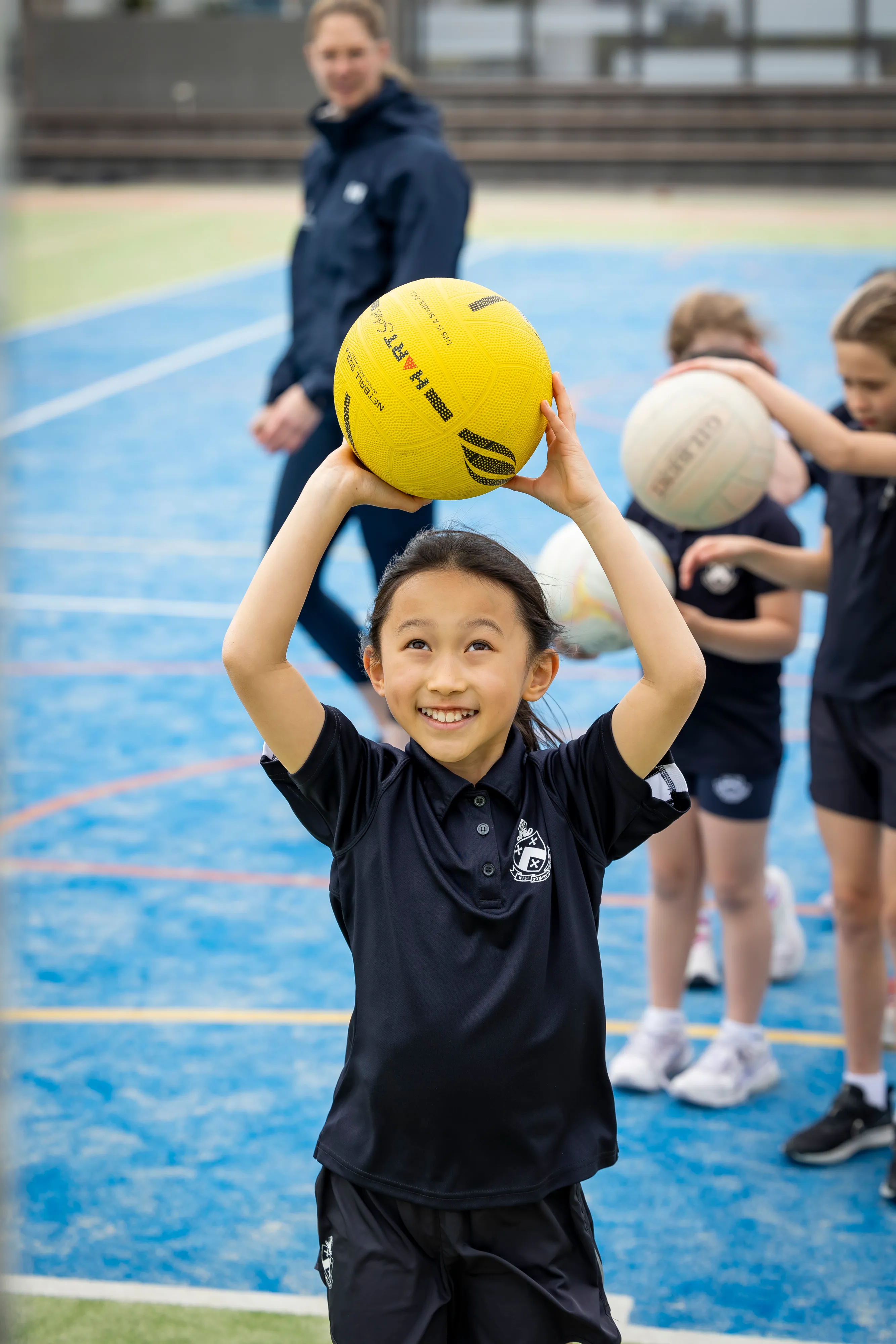
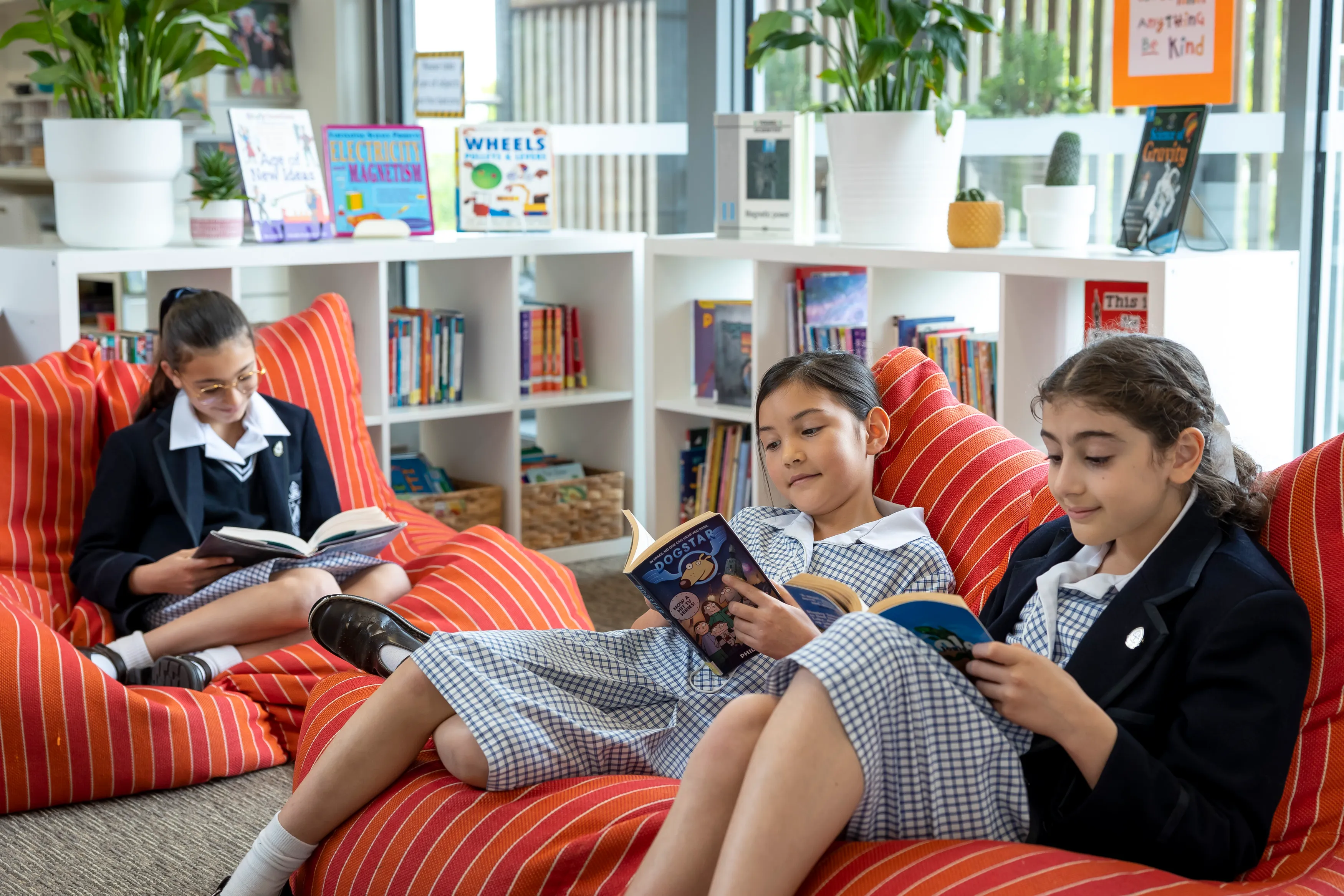
.jpg)
